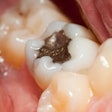Researchers at Rutgers University and the Monell Chemical Senses Center have found clues as to why certain foods feel the way they do in our mouths, according to a new study in Current Biology (October 9, 2012, Vol. 22:19, pp. R829-R830).
The research offers a new way of thinking about eating habits, both good and bad, because the way foods make mouths feel has a great deal to do with food selection, according to lead author Paul Breslin, PhD, a professor in the department of nutritional sciences at Rutgers.
The researchers knew that astringent wines feel rough and dry in our mouths. Fats, on the other hand, are slippery. There was the notion that the two might oppose each other, but it wasn't quite clear how that might really work.
Breslin and his co-authors found that weakly astringent brews -- in this case containing grape seed extract, a green tea ingredient, and aluminum sulfate -- build in perceived astringency with repeated sipping. When paired with dried meat, those astringent beverages counter the slippery sensation that goes with fattiness.
This natural tendency for seeking balance in our mouths might have benefits for maintaining a diversity of foods in our diet, Breslin noted. The opposition between fatty and astringent sensations allows humans to eat fatty foods more easily if astringents are ingested with them. Meanwhile, certain foods, such as fresh seeds and nuts, have fats and astringents in one package, so they may be self-balancing.















